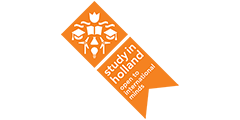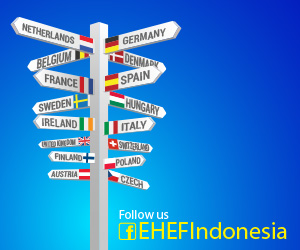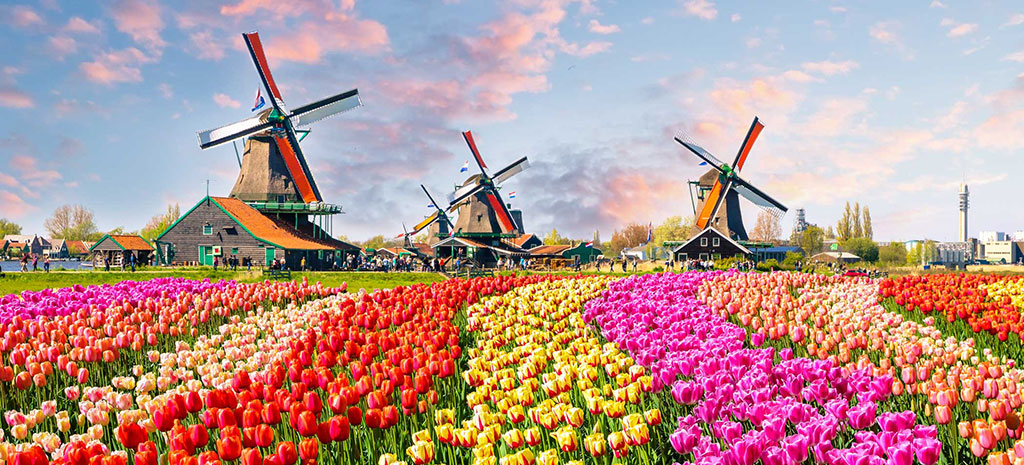
Study in The Netherlands
Last edited on 04 Mar 2026
Welcome to the Netherlands!
The Netherlands gets its name from the fact that around a quarter of this small northwestern European nation lies below sea level. Beyond its traditional associations (think windmills, tulips and clogs), it is one of the most developed and wealthy nations in the world, with a largely urban population. One of the most densely populated countries in Europe, it’s known for its tolerant and liberal ethos, and boasts a wealth of great student cities – none of which are more than a bicycle ride (the nation’s preferred mode of transport) away from some picturesque countryside.
The Netherlands is located in North Western Europe and is bordered by the North Sea to the north and west, Germany to the east and Belgium to the south. The inland area is below sea level in some places, protected by coastal dunes and dykes. The capital of the country is Amsterdam, but The Hague is the seat of the King, Government and Parliament. Leeuwarden, in the North, will be a European City of Culture in 2018. The country has a population of 16.8 million. Key economic sectors include agriculture, chemicals, energy, as well life sciences, new and sustainable energy, high tech (Micro and Nano technology, ICT), and research and development. The official language is Dutch, while English is also widely understood and spoken. The Netherlands is a member of multiple international organisations including the EU, the Council of Europe, the International Monetary Fund, the World Health Organisation (WHO), and the World Trade Organisation (WTO).
Higher Education System
The education system in the Netherlands is known for its high quality in education and research, its international study environment and its competitive pricing. The Netherlands has the most English taught courses after the UK. The Netherlands is particularly popular with international students, and according to the latest statistics from UNESCO, it is a host country to nearly 60,000 foreign students each year – including almost 1000 tertiary level students from India. The Netherlands is particularly popular with international students, and according to public higher education (DUO) 112,000 international students studied in Dutch higher education.
The Netherlands higher educational system is a dual system composed of two main types of regular higher education: university education and universities of applied sciences. Universities and universities of applied sciences award both Bachelor’s and Master’s degrees. A bachelor’s programme at a university requires three years of full-time study (180 ECTS credits) to complete, while a bachelor’s programme offered by a university of applied sciences requires four years of full-time study (240 credits). Depending on the discipline, Master’s programmes at universities, universities of applied sciences and institutes for International Education, last one to two years (60-120 ECTS credits). Doctorate (PhD) programmes are only offered at universities and last at least four years.
The Netherlands has a very high standard of education and a total of 13 universities feature in the Global Top 400 of the Times Higher Education World University Rankings 2015-2016, of which 8 – Wageningen University and Research Center (47), University of Amsterdam (58), Utrecht University (62), Delft University of Technology (65), Leiden University (67), Erasmus University Rotterdam (71), University of Groningen (74), and Maastricht University (88) – are ranked in the global Top 100.
A database of 2,100 international study programmes is available on the website of the Netherlands Education Support Office.
Universities in The Netherlands
Student Cities in The Netherlands
Amsterdam
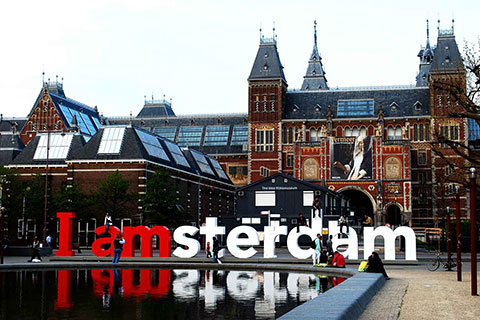
Featured among the world’s top 75 cities for students in the QS Best Student Cities index, Amsterdam is famed for its café culture, liberal attitudes, hordes of cyclists, pretty canals, historic architecture, and the nightlife which makes it a favorite among party-loving holiday-makers. It’s home to a large selection of world-renowned museums and art galleries, including the Van Gogh Museum, and is said to be the perfect place in which to understand the meaning of the Dutch word “gezellig” – roughly translated as “warm, fuzzy, cozy happiness”. In short, Amsterdam is likely to appeal to pretty much everyone.
The Netherlands’ capital is home to the country’s highest-ranking university, the University of Amsterdam (57th in the QS World University Rankings 2016-2017), as well as VU University Amsterdam (199th).
Leiden
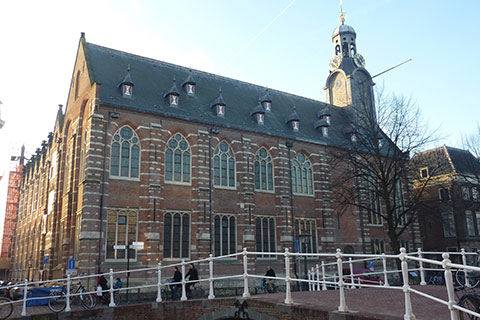
Less than an hour’s drive to the south-west of Amsterdam, Leiden is similarly characterized by scenic canals and historic buildings, as well as strong connections with the European art world – it was, for instance, the birthplace of Rembrandt. Much smaller than Amsterdam, the town is much more centered on its student community, which accounts for a significant chunk of the population and ensures a lively social scene. Leiden University is the Netherlands’ oldest university, founded in 1575, and currently ranks at joint 102nd in the world.
Utrecht
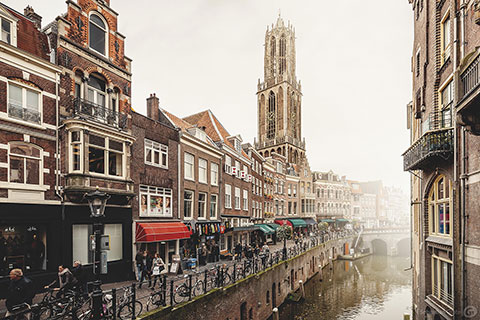
Towards the center of the country, and just half an hour’s drive from the capital, Utrecht is yet another charming canal-veined historic town. Its ancient city center is one of the oldest in the country, while the surrounding countryside in the province which shares the city’s name is famously beautiful, and peppered with castles and palaces. The city is the fourth most-populous in the Netherlands, with buzzing cultural and nightlife scenes, and is home to the country’s largest and third-highest ranked university, Utrecht University (ranked joint 104th in the world).
Groningen
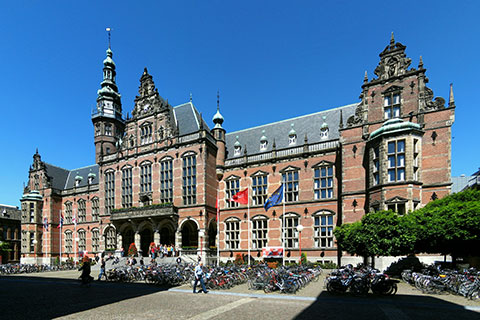
Travelling further towards the north of the country, we reach Groningen, the largest city in this northern part of the Netherlands – though still relatively small compared to Amsterdam or Utrecht. This is another city with a long history of having students at its center, and today students continue to comprise a significant part of the population and local life. There’s a vibrant cultural scene here, as well as the usual attractive gabled houses and canals, and between 2005 and 2007, Groningen was elected "de beste binnenstad" (the best city center) of the Netherlands. The University of Groningen is ranked joint 113th in the world.
Rotterdam
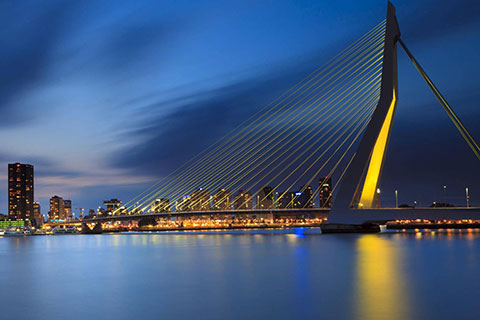
Home of Europe’s biggest port, the Netherlands’ second city Rotterdam stands out from the other cities here due to its distinctly modern feel – the result of damage during World War II, which meant the city had to be largely rebuilt. Its often striking modern structures make an apt backdrop to its buzzing social scene, famed for music (particularly electronic), nightlife and its multicultural community. The city is home to Erasmus University Rotterdam (ranked 144th in the world), named after the city’s most famous son, the hugely influential scholar Erasmus. Less than 10 miles (or 15km) away is the picturesque town Delft and its prestigious Delft University of Technology (62nd in the world).
Maastricht
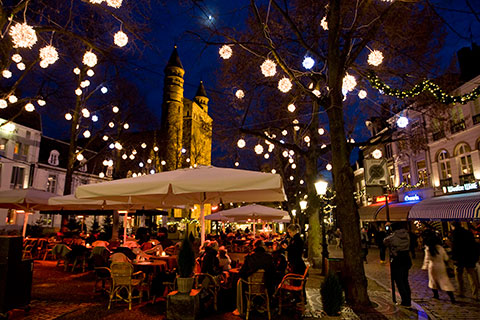
In the south of the Netherlands, close to the Belgian and German borders, Maastricht has a cosmopolitan and pan-European character, with multiple languages commonly spoken, a far-reaching reputation as a gastronomic hub, and a history of playing a key role in the development of the European Union. In contrast to much of the country, it even has some hills. Maastricht University calls itself ‘the most international university in the Netherlands’, with almost half (49%) of its students coming from other countries, representing over 100 different nationalities. Its overall rank in the QS World University Rankings 2016-2017 is 173.
After all, why not put Netherlands as your study destination since the country offers various attractions such as extremely high quality of education and tolerance living society. International environment which plays important role in personal and professional development would be triggered in student’s everyday life. You could find the internationalization within all the Dutch Higher Education Institutions (Research University or University of Applied Sciences), which spread out in 30 cities around the country, including: Den Haag, Eindhoven, Enschede, Nijmegen, Wageningen and many more.
Application, Fees and Visas in The Netherlands
Applying to study in the Netherlands
There are two systems for applying to Dutch universities – directly to the institution or through Studielink, an online centralized application procedure. The path you follow will depend on the university and the course to which you are applying. You may even be required to use a combination of the two, so check carefully with the institution.
Certain oversubscribed courses in the Netherlands are deemed “numerous fixus”. To get a place on one of these courses, you will need to be successful in a lottery – again, talk to the institution for further details. Tuition will be in Dutch or English, and you’ll need to be able to prove you have a sufficient level of fluency in the relevant language.
Fees and funding
Tuition fees vary depending on whether or not you are from a country within the European Union. If you are, the average annual fee is €1,950 (~US$2,200), and if not, you can expect to pay between €6,000 and €15,000 (US$6,750 - 16,850). However, there are various scholarship options available. For more information, visit our guide to scholarships in Europe.
Visas to study in the Netherlands
As with any nation in the European Union, the visa process differs according to whether or not you are a citizen of another nation in the EU (or Switzerland).
EU nationals:
You do not need a visa to study in the Netherlands.
You will need to register as an inhabitant with the local city council, proving that you have a place to live. You will also need to present your passport and birth certificate.
You must purchase health insurance. This is required by law.
It is advisable, though not compulsory, to register with the Dutch immigration authorities, for which you’ll need to prove you’ve enrolled at a Dutch university, sign a document to say you have sufficient financial means, and show you’ve purchased health insurance.
Non-EU nationals:
Depending on your nationality, you may need to apply for a provisional residence permit, known as an MVV (Machtiging tot Voorlopig Verblijf). The Nuffic website has the relevant information. Your host institution will probably make the actual application for you, but you will need to supply all the necessary documents, which must be in Dutch, English, French or German, or officially translated into one of these languages. As well as basic documentation showing you’re actually enrolled on a course, you will need to prove you have €833.22 (~US$940) a month to support yourself.
Chinese students enrolling on English language courses must also apply for the Nuffic Certificate, which can be done online through the Nuffic Certificate Online Application System, in order to get their MVV.
You will need to apply for a residence permit. Your institution will apply for this on your behalf, which should occur within five days of your arrival in the country. Your permit will be valid for a maximum of 12 months, after which you must renew. Some, but not all, institutions will do this for you, so make sure you check the process. The Netherlands coin
You must also register with the local Aliens Police (Vreemdelingendienst) within three days of arriving, to whom you must prove that you have somewhere to live and that you have enough money to support yourself during your stay.
You should also register with your local municipality.
Purchasing health insurance is mandatory.
If you want to work while you study, you will need to apply for a work permit, which will allow you to work for 10 hours a week during term time, and full time during holidays. Your employer will apply for this.
Fast fact
- Part of the Kingdom of the Netherlands (together with the Caribbean islands of Aruba, Curaçao and Sint Maarten)
- Constitutional parliamentary monarchy with bicameral legislature, headed by prime minister (currently Mark Rutte)
- Population: approx. 16.9 million
- Borders Belgium, Germany and the North Sea
- Part of the Benelux economic union, along with Belgium and Luxembourg
- Capital city: Amsterdam (but The Hague is the seat of the national government, as well as the location of the International Courts of Justice)
- Official language: Dutch, however 90% of Dutch society speak English fluently
- One of the flattest countries in the world; the highest point is only 321 meters above sea level
- The Netherlands boasts 15,000km (9,320 miles) of bicycle tracks – and this is a conservative estimate.
- Dutch people are the tallest in Europe, on average.
- Currency: Euro (€)
- Central European Time (UTC+1) switching to UTC+2 in summer
- International dialing code: 31
When is the last time you ever think about country of Windmills and Tulips? As the first non-English speaking country which offer English-thought study program, you would definitely write it on your study destination list. In fact, not only Gouda Cheese and Stroop Waffel knocked out your head, the reputation of Dutch Universities also catches the eyes of the world. 13 out of 14 research universities in the Netherlands are in the top 200 world university ranking. Can’t speak Dutch?! No worries! Everyone speaks English and you could enroll in one of 2,100 study programs conducted in full-English.
Dutch government strongly focuses on the internationalization of their education-related. Therefore, support in financing International students to study in the Netherlands is one of their priorities. If you are Indonesian and currently searching about how to finance your study, Dutch government have specialize the relations between the Netherlands and Indonesia through education cooperation. Here is the specific information of scholarships opportunities to study in the Netherlands. More information about study in Holland could be found on the official website of its national organization for education-related, Nuffic Neso Indonesia
Holland Scholarships
Focus Scholarship: Bachelor, Master
Competition: worldwide
Scholarship Coverage: Partial scholarship
The scholarship is made happened by Ministry of Education, Culture and Science in collaboration with the Dutch research universities and universities of applied sciences Netherlands to support more and more international students to experience not only Dutch society but living in the middle of ‘the world’ experience. The scholarship is intended for international students from outside the European Economic Area (EEA) who want to pursue a bachelor or master degree studies in the Netherlands. The benefit of the scholarships includes EUR 5000 for the first year of study. Similar to Orange Tulip Scholarships, make sure that your targeted university is listed in the scheme and start the application directly to the university which usually could be submitted along with your study program application.
Criteria
- non-EEA nationality
- have started admission process at Holland Scholarship’s partner universities for a full-time bachelor’s or master’s programme
- meet the specific requirements of the institution of your choice
- Do not have a degree from Dutch education institution before applying Holland Scholarship
Studeren in Nederland (StuNed)
Focus Scholarship: Master, non-degree
Competition: Indonesia
Scholarship Coverage: Full Scholarship
StuNed scholarship is a fully funded scholarship program for excellent candidates who would like to pursue their Master degree, short courses, and one distinctive program for institution called Tailor-made-training. Since it is a one and only bilateral scholarship program between the Netherlands and Indonesia, selection committee would take it to account these priority area: - Water - Agri-food and Horticulture - Health Management - International Trade, Finance, Economics - Transportation and Logistics - Security and Rule of Law Candidate who has been accepted to one of Dutch Universities in the Netherlands with a study program related to the priority area would benefit a plus point of chance to be awarded. They do not stop there! A strong motivation and excellence skill set, academic and non-academic record also strongly considered. Interview is not included in the selection process where the committee would only examine your documents. Make sure that you could indicate your strength, vision and mission in your motivation letter.
Criteria
- Indonesian Nationality proven by ID or Passport
- Obtained minimum Bachelor’s/ D4 degree with minimum GPA 3,00 (StuNed Master) / 2,75 (StuNed Short Course)
- Fresh Graduate or Employee eligible to apply for StuNed Master, 2 years of working experience for StuNed Short Course
- Received Letter of Acceptance (unconditional) from one of the Dutch Higher Education Institution
- Obtained English proficiency certificate with minimum score of IELTS 6,0 / TOEFL iBT 80 for Master ad IELTS 5,5 / TOEFL iBT 68 for Short Course.
- No age limit
Netherlands Fellowship Program (NFP)
Focus Scholarship: Master, PhD, non-degree
Competition: Developing Country
Scholarship Coverage: Ful Scholarship
NPF scholarship program was initialized for organizational capacity building in 51 countries through education and training for professionals. NFP is fully funded by the Ministry of Foreign Affairs of the Netherlands for short courses, Master to PhD program. Targeted candidates are excellent professionals who work, live and hold a citizenship in one of NFP countries. To be able to apply for this type of scholarships, candidate must be nominated by his/her organization and proposed a related training/courses to organizational situations or needs. Please note that not all of Dutch universities and study programs offer NFP scholarship, you could find the information on university’s website. Application should be sent directly to the university before the deadline (may vary).
Criteria
- hold a nationality of, working and living in one of the NFP partner’s countries;
- Provide employer’s statement that complies with the format Nuffic has provided.
- must not be employed by an organisation that has its own means of staff-development.
- must not receive more than one fellowship for courses that take place at the same time;
- must have a government statement that meets the requirements of the country in which the employer is established (if applicable).
Orange Tulip Scholarships (OTS)
Focus Scholarship: Foundation, Bachelor, Master
Competition: Designated country: Indonesia
Scholarship Coverage: Partial Scholarship
Different from StuNed and NFP, Orange Tulip Scholarship is a partial scholarship offered for Indonesian citizens and several countries where Nuffic Neso offices are located. Dutch higher education institutions, the Dutch company and the Indonesian government, joined as a sponsor to open up more opportunities in the Dutch study. You could consider t apply for this scholarship if your targeted university is listed in the OTS scheme (per country may vary). Once you have registered your study program the university, you could apply for OTS scholarships by sending your documents to Neso office. OTS would be awarded in the form of tuition fee waiver or living allowance depends on its scheme (per university).
Criteria
- Indonesian Citizens (OTS Indonesia)
- Not currently studying or working in the Netherlands
- Application for targeted study program at one of the Dutch universities has started or has been admitted proven by Letter of Acceptance
- Meet the special conditions required by the Orange Tulip Scholarship scheme (per university may vary)

